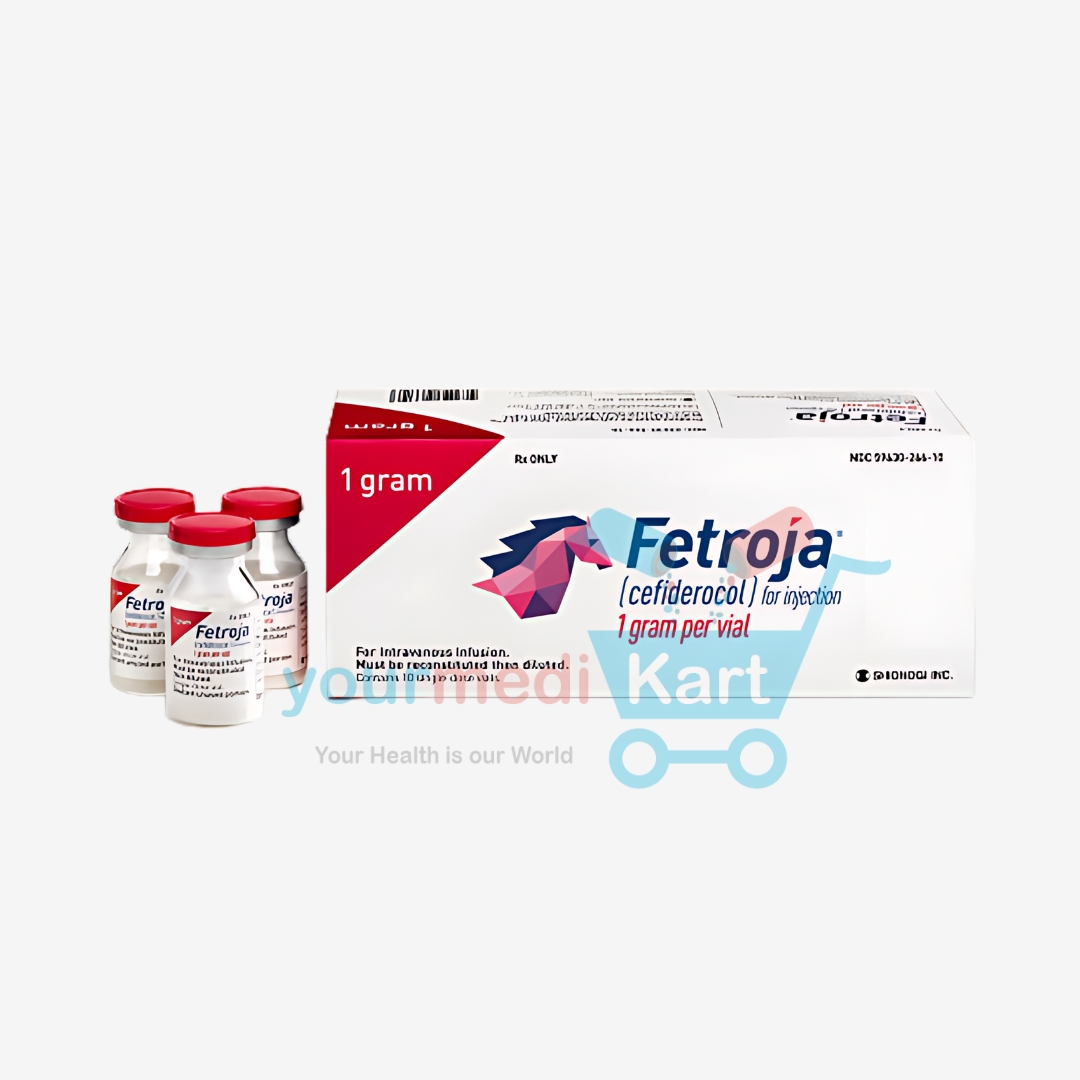Fetroja Cefiderocol 1mg injection available at competitive price in India on Yourmedikart and uses for severe bladder or kidney infections
Shionogi Inc.
Generic Name: Cefiderocol
Packing: 1 Gram Per Vial
- Fetroja Cefiderocol 1gm, know by its chemical name cefiderocol, is an antibiotic used to treat complicated urinary tract infections (cUTIs), including pyelonephritis, especially in cases involving multi-drug-resistant Gram-negative bacteria.
- It’s particularly effective against bacteria like Escherichia coli, Klebsiella pneumoniae, Proteus mirabilis, Pseudomonas aeruginosa, and Enterobacter cloacae complex. Fetroja is typically administer by injection into a vein and is often used when other treatment options are unavailable.

What is Fetroja?
- Fetroja Cefiderocol 1gm, Cephalosporin antibiotic, is utilize to manage severe bladder or kidney infections in adults.
- Additionally, it is prescribed for treating pneumonia in adults who acquired the infection while hospitalized or using a ventilator.
- There may be other uses for Fetroja that are not specifically mentioned in this medication guide.
- Fetroja (cefiderocol) is a cephalosporin antibacterial used to treat patients 18 years of age or older who have limited or no alternative treatment options
- For the treatment of complicated urinary tract infections (cUTI), including pyelonephritis caused by susceptible Gram-negative microorganisms.
How is Fetroja given?
- Follow all directions on your prescription label and read all medication guides or instruction sheets. Use the medicine exactly as direct.
- Fetroja Cefiderocol 1gm is injected into a vein.
- This medicine must be given slowly over 3 hours.
- Ask your doctor or pharmacist if you don’t understand how to use an injection.
- Fetroja must be mixed with a liquid (diluent) and then further diluted with another liquid in an IV bag. Prepare an injection only when you are ready to give it. Call your pharmacist if the medicine has changed colors or has particles in it.
- Do not reuse a needle or syringe. Place them in a puncture-proof “sharps” container and dispose of it following state or local laws. Keep out of the reach of children and pets.
- Fetroja is usually given for 7 to 14 days.
- Keep using this medicine even if your symptoms quickly improve. Skipping doses could make your infection resistant to medication. Fetroja will not treat a viral infection.
- This medicine can affect the results of certain medical tests. Tell any doctor who treats you that you are using Fetroja.
- Store vials in the original carton in a refrigerator. Protect from light.
- Fetroja Cefiderocol 1mg injection available at competitive price in India on Yourmedikart and uses for severe bladder or kidney infections

After mixing a diluent into the vial:
- Store at room temperature and further dilute into an IV bag within 1 hour.
- After diluting the mixture in an IV bag: Store the bag at room temperature for up to 6 hours, or in a refrigerator for up to 24 hours. Protect from light.
- After removing the IV bag from a refrigerator, you must use the medicine within 6 hours once it reaches room temperature.
- Each IV bag is for one use only. Throw it away after one use, even if there is still medicine left inside.
Fetroja side effects
Get emergency medical help if you have signs of an allergic reaction (hives, difficult breathing, swelling in your face or throat) or a severe skin reaction (fever, sore throat, burning in your eyes, skin pain, red or purple skin rash that spreads and causes blistering and peeling).
Fetroja may cause serious side effects. Call your doctor at once if you have:
- Severe stomach pain, diarrhea that is watery or bloody (even if it occurs months after your last dose)
- Tremor, rigid muscles, or a seizure
- White patches or sores inside your mouth or on your lips; or
- low potassium level–leg cramps, constipation, irregular heartbeats, fluttering in your chest, increased thirst or urination, numbness or tingling, muscle weakness or limp feeling.
Common side effects of Fetroja may include:
- Nausea, vomiting, Diarrhea, Constipation
- Mouth Sores
- Cough
- Abnormal liver function tests
- Headache
- Rash
- Pain, Redness, itching, bruising, or swelling around the IV needle.
Warnings
Fetroja can cause serious or life-threatening allergic reactions. Tell your doctor if you have an allergy to an antibiotic, especially penicillin.
Before taking this medicine
Fetroja can cause serious or life-threatening allergic reactions. So, You should not use Fetroja if you have ever had a severe allergic reaction to an antibiotic, such as:
- Cefadroxil, cefdinir, cefoxitin, cefprozil, ceftriaxone, cefuroxime, cephalexin, Keflex, Omnicef, and others
- Secondly Avibactam, Relebactam, sulbactam, Tazobactam, Vaborbactam, and others
- Amoxicillin (Amoxil, Augmentin, Moxatag), ampicillin, dicloxacillin, oxacillin, penicillin, and others.
Tell your doctor if you have ever had:
- An allergy to any drug
- Kidney disease
- A seizure
- liver disease; or
- Intestinal problems, such as colitis.
Tell your doctor if you are pregnant or breastfeeding.
Dosage for Fetroja
The dose of Fetroja Cefiderocol 1gm for injection is 2 grams administer every 8 hours by intravenous (IV) infusion over 3 hours in patients with creatinine clearance (CLcr) 60 to 119 mL/min.
- Fetroja Cefiderocol 1gmIn Children
-
- Safety and efficacy of Fetroja in pediatric patients younger than 18 years of age have not been establish.
- Fetroja Cefiderocol 1mg injection available at competitive price in India on Yourmedikart and uses for severe bladder or kidney infections
- What Drugs, Substances, or Supplements Interact with Fetroja?
-
- Fetroja Cefiderocol 1gm may interact with other medicines.
- Most Importantly Tell your doctor all medications and supplements you use.
- Fetroja Cefiderocol 1mg injection available at competitive price in India on Yourmedikart and uses for severe bladder or kidney infections
- Fetroja During Pregnancy and Breastfeeding
-
- Secondly Tell your doctor if you are pregnant or plan to become pregnant before using Fetroja; it is unknown how it would affect a fetus. It is unknown if Fetroja passes into breast milk. Consult your doctor before breastfeeding.
- Additional Information
-
- Tell your doctor if you are pregnant or plan to become pregnant before using Fetroja; it is unknown how it would affect a fetus. It is unknown if Fetroja passes into breast milk. Consult your doctor before breastfeeding.
- Mostly This is not a complete list of side effects and others may occur. Similarly Call your doctor for medical advice about side effects. You may report side effects to FDA at 1-800-FDA-1088.
Precautions
-
Increase in All-Cause Mortality in Patients with Carbapenem-Resistant Gram-Negative Bacterial Infections
-
- An increase in 28-Day all-cause mortality was observe in Fetroja-treat nosocomial pneumonia, bloodstream infections, or sepsis patients compare to those treat with best available therapy (BAT) in a clinical study (NCT02714595). Most BAT regimens contain colistin. All-cause mortality remains higher in patients treat with Fetroja than in patients treated with BAT through Day 49.
- Generally, deaths were in patients with infections cause by Gram-negative organisms, including non-fermenters such as Acinetobacter baumannii complex, Stenotrophomonas melophilia, and Pseudomonas aeruginosa, and were the result of worsening or complications of infection, or underlying comorbidities. The cause of the increase in mortality establish.
- Fourthly Closely monitor the clinical response to therapy in patients with cUTI and HABP/VABP.
-
Hypersensitivity Reactions
-
- Serious and occasionally fatal hypersensitivity (anaphylactic) reactions and serious skin reactions have report in patients receiving beta-lactam antibacterial drugs. Hypersensitivity was observe with Fetroja. Before Fetroja is institute, So, inquire about previous hypersensitivity to cephalosporins, penicillin, or other beta-lactam drugs. If an allergic reaction occurs, discontinue Fetroja.
-
Clostridioides difficile-associated Diarrhea (CDAD)
-
- CDAD report with nearly all systemic antibacterial agents, including Fetroja. Careful medical history is necessary because CDAD has report to occur more than 2 months after the administration of antibacterial agents. If CDAD is suspect or confirm, antibacterial drugs not direct against C. difficile may need discontinue.
-
Seizures and Other Central Nervous System (CNS) Adverse Reactions
-
- Firstly Cephalosporins, including Fetroja, have implicate in triggering CNS adverse reactions such as seizures. Encephalopathy, coma, Asterixis, and Neuromuscular Excitability have report with Cephalosporins Particularly in patients with history of Epilepsy and/or when Recommend dosages of Cephalosporins were Exceed due to renal Impairment. Adjust Fetroja dosing base on Creatinine Clearance. If focal tremors or Seizures occur, Evaluate patients to Determine whether Fetroja should be Discontinue.
-
Development of Drug-Resistant Bacteria
-
- Prescribing Fetroja in the absence of a proven or strongly suspected bacterial Infection or a Prophylactic Indication is unlikely to provide benefit to the patient and increases the risk of the development of drug-resistant bacteria.
ADVERSE REACTIONS
- The most common adverse reactions Occurring in ≥2% of patients Receiving Fetroja in the cUTI trial Were: Diarrhea (4%), Infusion site Reactions (4%), Constipation (3%), rash (3%), Candidiasis (2%), cough (2%), Elevations in liver tests (2%), headache (2%), Hypokalemia (2%), nausea (2%), and Vomiting (2%).
- The most common adverse Reactions Occurring in ≥4% of patients Receiving Fetroja in the HABP/VABP trial were Elevations in liver tests (16%), Hypokalemia (11%), diarrhea (9%), Hypomagnesemia (5%), and atrial Fibrillation (5%).
Cefiderocol
- Discover information about Fetroja Generic and the Fetroja Cost. Learn about Cefiderocol, its uses, and availability, including Cefiderocol Donde Comprar and Cefiderocol Que Es.
- Explore Fetroja Antibiotic, Fetroja, and its applications as a Fetroja Medication. For pricing, see the Cefiderocol Price, Fetroja Price, and the Fetroja Injection Price in India.
- Learn about Cefiderocol Price in India, Fetroja IV, and the Cefiderocol Antibiotic. For global information, explore Fetroja Preis, Cefiderocol دواء, and Cefiderocol Цена.
- Understand its classification under Fetroja Drug Class and potential Fetroja Side Effects. Learn about the Cefiderocol Generic, what is Fetroja, and the Cefiderocol Injection. Related terms include Cefiderol and Vaborbactam Injection.
Fetroja Cefiderocol
- Fetroja 1gm Injection (Cefiderocol) is a cutting-edge siderophore cephalosporin antibiotic developed to combat multidrug-resistant Gram-negative bacterial infections.
- Recognized globally as Fetroja and known by its active ingredient Cefiderocol, this advanced therapy offers a novel mechanism of action. Healthcare providers seeking Cefiderocol price in India or Fetroja price in India can now access it with trusted sourcing from YourMedikart.
- Looking for advanced treatment options? Cefiderocol pret, sold as Fetroja, is a cutting-edge antibiotic now available in India. Find the latest cefiderocol price in India and genuine cefiderocol injection online.
- Learn more about Fetroja cost, real-time cefiderocol price, and possible savings using a Fetroja coupon. This trusted Fetroja antibiotic is used in hospital settings via Fetroja IV infusion. Know everything about Fetroja price and how cefiderocol is helping patients worldwide.
- If you’re researching the cefiderocol generic or the benefits of cefiderocol antibiotic, you’re at the right place.
- You can buy Fetroja online now and get rapid access to this important Fetroja injection. We also provide info on cefiderocol cost, where to find cefiderocol in India, and the current cefiderocol injection price.
- International buyers may search for Fetroja fiyat, Fetcroja pret, or ask cefiderocol donde comprar. For India-specific users, see the updated Fetroja price in India or check for the Fetroja generic. Other antibiotics like Inj Augmentin 1gm may be referenced for comparison. You can also compare cefiderocol cena, verify cefiderocol availability in India, and understand how it compares to cefoxitin generic name. Make sure to check your correct Fetroja dose and complete information about Fetroja Cefiderocol at YourMedikart.





